|
|
|
Sort Order |
|
|
|
Items / Page
|
|
|
|
|
|
|
| Srl | Item |
| 1 |
ID:
138260
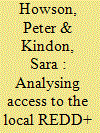

|
|
|
|
|
| Summary/Abstract |
The Reducing Emissions from Deforestation and Forest Degradation (REDD+) project in Sungai Lamandau was Indonesia's first forest carbon finance initiative officially proposed by a community group upon land they intended to control autonomously. However, the flagging carbon market and government licensing obstructions stalled progress towards possible monetary gains. With a focus on the agency of local farmers, we explore the ‘bundles of powers’ that they mobilised to access the other diverse and, at times, elusive set of benefits within the REDD+ project. In the absence of a formal tenure and ‘carbon rights’ regime, local actors' ability to benefit from the project was dependent on social relationships, REDD+ knowledge and access to local markets and capital. The result was a benefit-sharing framework of uneven distribution.
|
|
|
|
|
|
|
|
|
|
|
|
|
|
|
|
| 2 |
ID:
138258
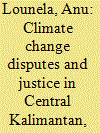

|
|
|
|
|
| Summary/Abstract |
In 2010, the province of Central Kalimantan in Indonesia was established as a Climate Change pilot province to reduce emissions from deforestation and through peat land forest rehabilitation. Today, international agencies, carbon traders, local and national governments, non-governmental organisations, and local populations have participated in debates and disputes over the establishment of carbon forests and forest protection areas in Central Kalimantan. One such scheme, promoted by the government of Australia (Kalimantan Forest and Climate Partnership), intended to establish a REDD+ pilot project within an area that covers about 120 000 hectares in Kuala Kapuas in Central Kalimantan, the field location of this research. This specific dispute offers a case study based on ethnographic research that helps to illustrate how widespread climate change debates and disputes become embedded at local and national levels in Indonesia. The dispute over REDD+ will be discussed within a framework of dispute theories which focus on moments of crisis, wherein participants must present arguments and justify their actions and theories of justice. The article shows that competing and conflicting conceptions of justice that emerge in the dispute may bring to a halt a climate change pilot project in the locality.
|
|
|
|
|
|
|
|
|
|
|
|
|
|
|
|
| 3 |
ID:
138255
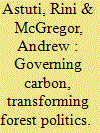

|
|
|
|
|
| Summary/Abstract |
The Reducing Emissions from Deforestation and Forest Degradation Plus (REDD+) programme seeks to reshape the way we value, govern and interact with forests. Rather than managing forests according to interests in timber, conservation, land or livelihoods, REDD+ encourages forms of forest management that prioritise carbon. While international negotiations are shaping the rules of the programme, how it takes place on the ground will depend on its interpretation and implementation in different places. In this paper, we are interested in how the REDD+ Task Force (Satgas REDD+), an ad hoc body formed by presidential decree to design and implement REDD+ readiness activities in Indonesia, has attempted to mainstream the programme from 2010 to 2013. We develop a governmentality approach to focus on how the Task Force sought to introduce REDD+ carbon rationalities to forest politics. Based on extended ethnographic research, we identify three strategies: adopting and promoting the carbon discourses circulating among global REDD+ communities; making carbon visible and governable through mapping technologies; and implementing participatory technologies to encourage pro-REDD+ subjectivities. In some ways, the Task Force has been successful in building awareness about forest carbon among forest stakeholders in Indonesia. National civil society organisations, in particular, appear to be supportive of REDD+; however, they emphasise ‘co-benefits’ framed as ‘Beyond Carbon’, informed by social and environmental justice. For others, however, forests remain sources of timber and land, and new strategies are required if REDD+ is to have substantial impacts on forest governance in Indonesia. The Task Force's efforts reveal the difficult and contested processes through which global climate change programmes come to be embedded in national arenas.
|
|
|
|
|
|
|
|
|
|
|
|
|
|
|
|
| 4 |
ID:
138265


|
|
|
|
|
| Summary/Abstract |
This article explores the potential impact of increased school choice, specifically of proposed charter (partnership) schools, on educational inequality in New Zealand. An initial review of the educational marketplace literature proves inconclusive as to whether privatised schooling is capable of reducing disparity in academic outcomes and broader social contexts, and even suggests it might further increase segregation. Subsequently, the article presents a case study of educational inequality in Chile (1990–2010) to set up a comparison of an education system that has become increasingly market based and unequal. The 20-year time frame was selected to cover the shift to decentralised education under Pinochet until the large-scale breakout of student protests against systemic inequality, known as the ‘Chilean Winter’. In conclusion, the article suggests that a successful strategy to counter educational disparity needs to create viable alternatives to a free-market approach and, as such, it appears that there are important lessons that New Zealand can learn from the Chilean Winter – lessons that go beyond the implementation of charter schools to fundamental social structures.
|
|
|
|
|
|
|
|
|
|
|
|
|
|
|
|
| 5 |
ID:
138261
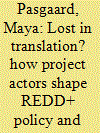

|
|
|
|
|
| Summary/Abstract |
Forest protection policies to Reduce Emissions from Deforestation and forest Degradation (REDD+) are currently being implemented by international donors, governments and conservation agencies across the developing world aiming for reduction of greenhouse gases while ensuring fair distribution of benefits. This paper draws on a case study in northern Cambodia to analyse how conservation practitioners and the local forest management committees engaged in implementing REDD+ actively translate and influence the policy and its implementation in accordance with their respective interests through particular communication strategies. When assessing project progress and outcomes, the conservation practitioners involved in implementing projects show an interest in emphasising positive project assessments by downplaying potential project complications, and by primarily communicating with pro-REDD+ members of the local communities. Powerful actors in the local forest management committees adopt the conservation rhetoric of these practitioners; at the same time, they can interpret and control local access to resources to their own advantage. By doing so, they can ensure continued support, while not necessarily representing all community members or sharing benefits equally. The processes and consequences of this policy translation in a REDD+ arena are discussed and compared with existing dominant trends in environment and development policies.
|
|
|
|
|
|
|
|
|
|
|
|
|
|
|
|
| 6 |
ID:
138254
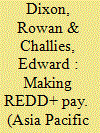

|
|
|
|
|
| Summary/Abstract |
This paper presents an analysis of changing rationales and tactics among actors engaged in mobilising private finance for Indonesia's emergent Reducing Emissions from Deforestation and Forest Degradation (REDD+) programme. Despite limited flows of private finance so far, private sector actors have been responsible for a great deal of development and innovation in the forest carbon sector in Indonesia, and have thus played – and continue to play – an important part in shaping the country's REDD+ programme. Drawing on extended field research and interviews with key actors engaged with REDD+ in Indonesia, we identify a variety of private investor motivations, strategies and tactics, many of which depart considerably from the common understanding of REDD+ as avoided deforestation funded through carbon offsets. As non-state actors increasingly shape emerging REDD+ projects, they assume important roles as agents of environmental governance – working through a variety of private market and hybrid modes of forest/climate governance. We describe four general modes of engagement, centred around: investment in REDD+ verified emissions reductions; corporate social responsibility; sustainable commodities; and impact investment. The research thus contributes to an improved understanding of the nature of private REDD+ finance in Indonesia, and the implications, potential and limits of private, market-based climate governance.
|
|
|
|
|
|
|
|
|
|
|
|
|
|
|
|
| 7 |
ID:
138264
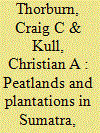

|
|
|
|
|
| Summary/Abstract |
Peatlands play a crucial role in Indonesia's economic development, and in its stated goal of reducing greenhouse gas emissions. Improved peatland management – including a national moratorium on the granting of any new conversion licenses – forms a cornerstone of Indonesia's climate change mitigation commitment. At the same time, rapid expansion of the plantation sector is driving wide-scale drainage and conversion of peat swamp ecosystems. The province of Riau, in central Sumatra, finds itself at the crossroads of these conflicting agendas. This essay presents a case study of three islands on Riau's east coast affected by industrial timber plantation concessions. It examines the divergent experiences, perceptions and responses of communities on the islands. A mix of dramatic protests, localised everyday actions and constructive dialogue has succeeded in delaying or perhaps halting one of the concessions, while negotiations and contestation with the other two continue. With the support of regional and national non-governmental organisations and local government, communities are pursuing alternative development strategies, including the cultivation of sago, which requires no peat drainage. While a powerful political economy of state and corporate actors shapes the contours of socio-environmental change, local social movements can alter trajectories of change, promoting incremental improvements and alternative pathways.
|
|
|
|
|
|
|
|
|
|
|
|
|
|
|
|
| 8 |
ID:
138256


|
|
|
|
|
| Summary/Abstract |
REDD+ (Reducing Emissions from Deforestation and Forest Degradation) started as a global project aimed at reducing CO2 emissions by protecting tropical forests. At the same time, several so-called co-benefits were listed in the original documents, such as biodiversity and other environmental services, poverty reduction and sustainable livelihoods, and good governance. I argue that REDD+ quickly became a project in which these co-benefits have emerged to be of central concern and that the rights of affected forest populations today dominate much of the REDD+ discourse. One reason for the redirected focus of REDD+ can be attributed to the activities of international and national environmental and human rights organisations. While this has arguably contributed to a process of democratisation in Indonesia, it has also slowed down the implementation of readiness projects. Taking my example from the UN-REDD initiative in Central Sulawesi, I examine some reasons why it has been difficult to establish the proposed five REDD sites in the province.
|
|
|
|
|
|
|
|
|
|
|
|
|
|
|
|
| 9 |
ID:
138262
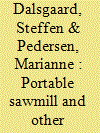

|
|
|
|
|
| Summary/Abstract |
The future for Reducing Emissions from Deforestation and Forest Degradation Plus (REDD+) in Papua New Guinea (PNG) is uncertain. Logging companies have been accessing land via a controversial legal framework called Special Agricultural Business Lease, while conservation non-government organisations are struggling to find schemes to stop the deforestation. REDD+ has been the new favoured approach. However, there are as yet only a few pilot projects, several of which are in areas without large-scale logging. Whether REDD+ has a future in PNG is difficult to know. It may come to share the fate of the portable sawmill – a technology previously assumed to promote sustainable community logging, but is now adopted by the commercial logging industry and providing new challenges to conversation efforts. This article argues that to understand the possibility for successfully implementing REDD+, it is necessary to look at the development of the forestry sector in the widest possible terms. This involves analysing the different competing actors, technologies and forms of social organisation that are employed to gain control of species deemed valuable to either conservation or commercial resource exploitation.
|
|
|
|
|
|
|
|
|
|
|
|
|
|
|
|
| 10 |
ID:
138263
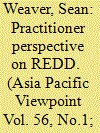

|
|
|
|
|
| Summary/Abstract |
This paper presents a practitioner perspective on community-based REDD (Reducing Emissions from Deforestation and forest Degradation) projects in the Pacific Islands. It draws upon the author's experience in forest conservation financing since 1987, and REDD project and programme design, development and implementation since 2006. The aim is to highlight the commercial challenges faced by REDD practitioners, and explore strategic (including policy) solutions to meet these challenges. The paper begins by situating REDD as a tool for forest conservation and community development. Following a brief overview of the key elements of REDD project development procedures, the paper examines commercial (particularly market access) challenges faced by project proponents, together with challenges associated with the supply and demand dynamic for REDD credits in the global carbon market. This is situated against a backdrop of global policy stagnation in the REDD sector and the implications of this for those at the frontier of community-based forest protection efforts on the ground. The paper culminates by showing the importance of an effective partnership between governments, rainforest communities and the private sector in regional and global rainforest conservation financing.
|
|
|
|
|
|
|
|
|
|
|
|
|
|
|
|
| 11 |
ID:
138257
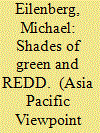

|
|
|
|
|
| Summary/Abstract |
In a time of increasing land enclosures sparked by large-scale environmental initiatives and agricultural expansion, this paper examines local and global contestations over the value of forest on an Indonesian forest frontier. Engaging with recent debates on carbon forestry, the paper problematises the emerging initiatives of ‘Reducing Emissions from Deforestation and Forest Degradation’ known as REDD+ in the province of West Kalimantan, Indonesia. The paper argues that the general rush to implement REDD+ without intimate knowledge of the political landscape of resource struggle is in danger of generating new enclosures of land that may be easily appropriated by local elites, thus excluding less fortunate sections of local society. The paper shows how divergent interpretations of REDD+ are triggering land disputes, and how powerful actors readily appropriate REDD+ discourses as a tool to support divergent claims of land ownership. Government and villagers, through overlapping and contradictory engagements, negotiate REDD+ initiatives with global environmental actors and private plantation companies. The paper highlights the implications of these local realities for the successes of REDD+. The Kalimantan case highlights some of the dilemmas of carbon mitigation initiatives experienced in frontier regions throughout Southeast Asia, places that have become prime battlefronts of large-scale climate change initiatives and agrarian expansion.
|
|
|
|
|
|
|
|
|
|
|
|
|
|
|
|
| 12 |
ID:
138259
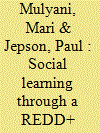

|
|
|
|
|
| Summary/Abstract |
This paper examines the process for establishing a ‘village agreement’ using the Kalimantan Forests and Climate Partnership (KFCP) as a case study. REDD+ is designed as a ‘performance-based’ mechanism and requires a contractual agreement between the parties involved. Since its implementation will affect the life of forest-dependent communities, it is vital that villagers have sufficient ability to negotiate their interests during the agreement process. This paper investigates the degree of ‘social learning’ essential for developing actors' capacity to negotiate rules and interests with outsiders involved in the agreement process (between KFCP and the seven villages involved) and how this meshes with notions of ‘participation’. It found that while ‘social learning’ occurred as a result of the well-designed participatory process conducted by KFCP, villagers' ability to secure their interests was influenced by a learning experience accumulated from their previous engagement with several development/conservation projects. This finding contributes to literature by emphasising how historical context plays a significant role in the success of present learning and the efficacy or otherwise of a contractual agreement. Therefore historical aspects should be taken into account in site selection and the design of future REDD+ projects.
|
|
|
|
|
|
|
|
|
|
|
|
|
|
|
|
|
|
|
|
|